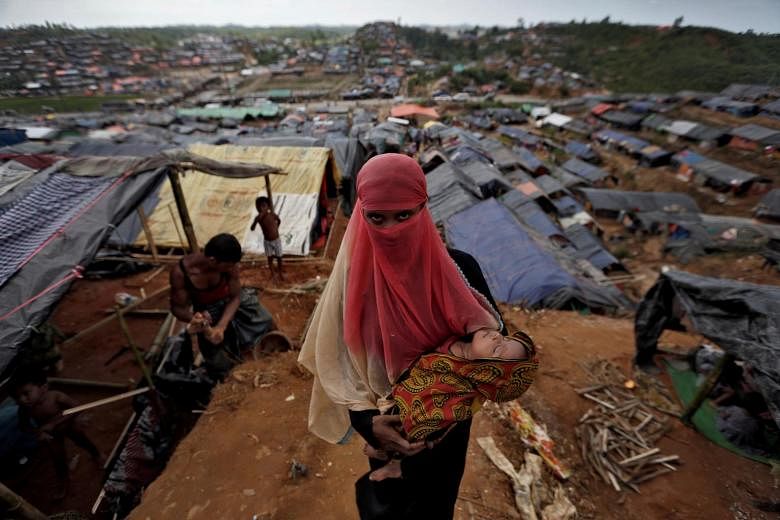DHAKA (THE DAILY STAR/ASIA NEWS NETWORK) - After August 25, 2017, headlines across the world were dominated by the exodus of hundreds of thousands of Rohingya refugees fleeing to Bangladesh.
This continued for almost a month after Myanmar security forces launched a deadly crackdown, or "clearance operation", targeting the minority population from Rakhine state.
A 444-page report prepared by the United Nation's (UN) Independent Facts Finding Commission confirmed that more than 725,000 Rohingya fled to Bangladesh, at least 10,000 Rohingya were killed, hundreds of women and girls were raped (mostly gang-raped), and around 392 Rohingya villages were partially or fully destroyed.
Since then, Bangladesh has become home to 1.1 million Rohingya refugees, including those who have fled previous bouts of violence as well as new arrivals.
Kutupalong refugee camp, which covers an area of 13 kilometres, has become the largest refugee camp in the world for hosting 700,000 Rohingya refugees in a single camp.
Aug 25 marks the third anniversary of the Rohingya influx in Bangladesh, but the solution to the Rohingya crisis has not been found yet.
The Rohingya community living in Bangladesh are frequently portrayed in two ways - national and international human rights bodies focus on their everyday struggle for food and water supply, sanitation, healthcare, housing, education, cooking materials, childcare, maternity support and daily essentials; whilst the host community often criticise the easy access of refugees to support from national and international aid agencies.
There are also increasing concerns regarding the growing degradation of the local ecology, rapid deforestation from using firewood, mounting illegal border trade, encroaching of grassland for livestock rearing and more.
These issues are gradually eroding the space of coexistence between the host community and refugees.
Besides, growing tensions in connection with inter-group and intra-group conflicts as well as militant activities in the refugee camps, mounting cases of trafficking, and worries of reduced aid due to decreasing international support, are increasing the mistrust between the Rohingya and the host community, which is some cause for concern.
During the last three years, two repatriation attempts were made. The first one was on November 15, 2018, and the second one was in August 2019, but they failed mainly due to three reasons.
Firstly, Myanmar's continued reluctance and unwillingness to bring the Rohingya back.
There were no convincing and tangible preparations taken by Myanmar in accordance with the "Arrangement on the return of displaced person from Rakhine State" signed between Bangladesh and Myanmar in January 2018.
Secondly, the international community did not support the repatriation attempts, which they termed as a premature move, because Rakhine's situation remained unchanged and thereby, unsafe for the Rohingyas.
Thirdly, the Rohingya refugees declined to return voluntarily because Myanmar had failed to give any reliable promise or consistent commitment to the Rohingya to guarantee their rights as citizens of Myanmar.
Afterwards, the ongoing Covid-19 pandemic affected the camps and halted all repatriation endeavours.
As a result, the fate of repatriation is hanging in the balance, and the future of the Rohingya is becoming increasingly uncertain.
It is clear that Myanmar is in no hurry to resolve the Rohingya crisis, with no concrete steps mapped out to address or redress injustices in their country.
On the other hand, Bangladesh seems increasingly more reluctant to host such a massive refugee population on its territory. Three years have passed, but there is no light at the end of the tunnel for the persecuted Rohingya population.
Perhaps mounting pressure from the international community and international rights bodies, media portrayal of Rohingya vulnerabilities and continued efforts from Bangladesh might compel Myanmar to initiate the repatriation process for the third time, but it would certainly fail again because there are no dependable promises or tangible preparations from the Myanmar end that would give the Rohingya enough trust to return to their homeland voluntarily.
However, based on previous experiences and the unexpected present situation, we can assume that Bangladesh will not willingly host 1.1 million Rohingya any more or give them space for social integration at any cost, and the option of third country resettlement has also been stopped because of the pandemic.
Considering these multifaceted dilemmas, the Rohingya people are leading their lives in extreme uncertainty. We can see no bright light of hope except their struggling present and an uncertain future.
Although the Rohingya eagerly await a safe and dignified return to their homeland, they find little hopes in the given context of the Rohingya crisis.
The question now is: what needs to be done for the future of the Rohingya people? We strongly expect, with a renewed appeal, that the international community should uphold the idea of "burden-sharing" to help the Rohingya in refugee camps and make their lives more "liveable" in Bangladesh.
There should also be efforts to form a "collective and global force" to compel Myanmar to comply with the Universal Declaration of Human Rights adopted by the UN in 1948 to bring the Rohingya living in Bangladesh back to Myanmar with safety, dignity and legal recognition by conferring citizenship on them.
Nasir Uddin is a cultural anthropologist and a professor of anthropology at the University of Chittagong. The Daily Star is a member of The Straits Times media partner Asia News Network, an alliance of 24 news media organisations.

